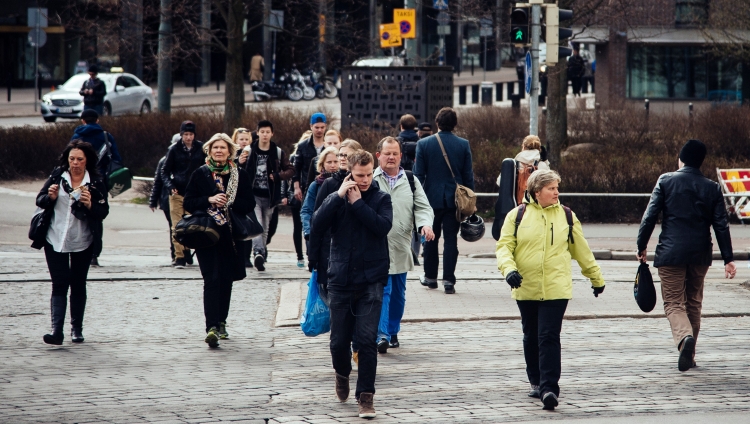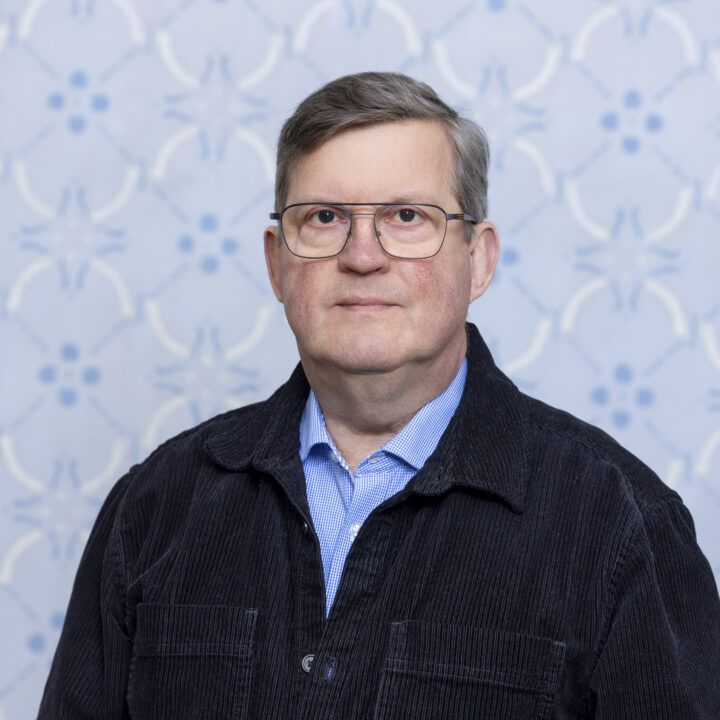
Improved data and knowledge exchange on human development needed in Nordic-Baltic Region
Migration and the movement of labour are contributing to the development of and cooperation between the Nordic countries and the Baltic States. This is very much a positive thing, but you have to recognise that if the movement is mostly in one direction, there’s the risk of a brain drain which could lead to long-term social and economic instability in the region. Not to mention the aging population and the impact of the financial crisis. The Nordic-Baltic region is so tightly connected that we can’t afford to ignore these threats. That’s why we’ve decided to initiate a project on migration and demographic challenges in the region.
The starting event of the project was the ‘Migration and Demographic Challenges in the Nordic-Baltic Region’ conference in March 2013. The aim of the conference was to bring together the results from a number of studies on migration and labour mobility in the Nordic countries and Baltic States. Around 240 researchers, experts and policy- and decision-makers gathered to exchange experiences and present key findings from recent studies in order to start shaping a common understanding in the region regarding migration and demographic challenges. Migration- and population-themed events were also organised by the Nordic Council of Ministers’ offices in Latvia and Lithuania in 2013.
A year after the opening event of the labour migration and population development project we organised a high-level conference entitled ‘Labour Mobility and Transnationalism in the Nordic-Baltic Region’ in association with the University of Tartu, the Estonian Ministry of Social Affairs and other partners. The central themes of the event were transnationalism as a new phenomenon and the Ministry of Social Affairs’ political analysis entitled ‘The emigration potential of the working-age population of Estonia in 2013’. Around 70,000 people commute from one country to another every day in the Nordic region. The Nordic countries have gained from this development. But what if we managed to make people and companies value the Nordic-Baltic region? What if we got rid of all the boundaries and helped the people in our region develop, work and live? The topicality and importance of the theme were reflected in the media coverage the event gained and the large number of attendees – more than 230 experts, researchers, policy-shapers, officials and other interested people from Estonia and abroad.
The third Nordic-Baltic labour migration conference 2015 focussed on immigration, more particularly preparedness for new trends – which could see Estonia, Latvia and Lithuania becoming migration destinations, including for those returning from other countries. Increasing immigration calls for a significant change in opinions and attitudes in the society. Different ways of thinking and cultural backgrounds are the foundation of all kinds of innovative ideas, so one should regard immigration as an important development opportunity. The conference hosted more than 200 guests: authorities, politicians, company and employer organisations, researchers, non-profit organisations and experts whose field of work includes labour migration and/or immigration issues in the Nordic countries and Baltic States. A video of the entire conference can be viewed on the website of daily Postimees.
The main topic of the fourth conference in 2016 was immigration to the Nordic and Baltic countries and, more specifically – our preparedness to deal with new arrivals, including the adaption process and subsequent integration of the beneficiaries of international protection. Experts shared their experiences with handling the migration flow of people coming from increasingly varying ethnic and cultural backgrounds, starting from the documentation process and finding them a place to live and work to assisting orphaned war refugees. They brought examples of how to inform citizens of receiving countries and explain the situation. Watch videos from the conference on our YuoTube channel.
Nordic-Baltic migration conference 2017 was headlined ““Immigration to the Nordic-Baltic region: New challenges for nation states in the age of migration”. First half of the conference dealt with immigration policy and the challenges of integrating the new wave of asylum seekers to Europe, while the second half looked at the interrelations between the media and migration and the new challenges migration is creating for nation states. The topic of the keynote speech given by MEP Professor Marju Lauristin was the changing definition and future of nation states and the emphasis on the importance of shifting the balancing point of integration policy between the EU-wide level and the nation state level. Currently too much is left up to nation states or even local municipalities, with too little regulation on the EU side.
A recurring theme of many of the presentations was integration on the labour market and in employment as well as culturally. States must help to ensure that migrants have easier and faster access to the labour market through changes in policy. Likewise, immigrants integrating with their host country’s culture is even more important than merely learning its language. It could even be concluded that without cultural integration there can be no nation states. Another major theme was the sharing of a series of guidelines for dealing with crisis scenarios. The keywords were establishing constant and honest communication; leaving aside emotions and maintaining rationality whilst also retaining empathy; involving as many relevant parties in resolving the crisis as possible; and sustaining healthy relationships with everyone involved, no matter how difficult it may seem. Overall it is important to find a balance between idealism (what should be done) and pragmatism (what can be done). See conference video online.
Visit our image gallery to view pictures from the conferences.
See more
- Tiit Tammaru: European societies and cities have changed
- Raul Eamets: the refugee crisis – surprise, confusion, despair, anger. What next?
- Overview of second day of migration conference 2016: The role of the state and local authorities in receiving refugees
- Summary of 2014 conference: Estonians less interested in working abroad
- Berth Sundström: Removing border obstacles between neighbours brings (and keeps) people together
- Summary of 2013 seminar: Smart migration policy attracts talent and guarantees welfare
- Newspaper Eesti Päevaleht: Organisers happy with results of ‘Bringing talent home’ campaign
- Video: summary of the 2013 conference
- Summary of 2013 conference: Improved data and knowledge exchange on human development needed in Nordic-Baltic Region
- Minister of Social Affairs of Estonia Taavi Rõivas: An adequate overview of migration flows and labour mobility in the Nordic-Baltic Region is needed
- Berth Sundström: Skilled workers are worth their weight in gold to all countries
- Postimees: Raul Eamets, Tiit Tammaru: International migration trends in Estonia
- ERR: Terevisioon morning news
- ERR: Vikerraadio news
- ERR: Radio 4 news
- ERR: Aktuaalne Kaamera, TV news
- Seitsmesed uudised (TV3): Estonia would only benefit from increasing migration
- Newspaper Pealinn: Rainer Kattel: Migration would help Estonian economy grow
- Newspaper Pealinn: University of Tartu professor: Immigrants promote economic development
- Novaator.err: Demographer: Immigration growing strongly in shadow of emigration
- Tallinna TV: Ivar Raig: Nordic countries are ignoring threats arising from immigration
- Regional newspaper Pärnu Postimees: Meelis Kukk: Feeling at home brings back home
- Postimees E24 newsfeed: Nordic-Baltic labour migration conference to examine transnationalism (press release)
- Radio 2: Eeva Esse
- Newspaper Eesti Päevaleht: Tiit Tammaru: A transnationalising Estonia
- Morning TV programme (Estonian National Broadcasting ERR) Terevisioon: EU Commissioner for Employment: It’s a threat when large numbers of working people leave
- uudised.err.ee: EU Commissioner for Employment: Those working abroad could return home with their experience
- arileht.delfi.ee: EU Commissioner for Employment: Those working abroad could return home with their experience
- delfi.ee: More and more Estonians looking to work in Estonia
- Tarbija24.ee (newspaper Postimees): Estonians showing less tendency to go to work abroad
- Local paper Võrumaa Teataja: Survey: Number of Estonian residents working abroad has decreased in last twelve months
- Vikerraadio news: Many of those who have left Estonia are willing to return
- Radio Kuku: Under the magnifying glass: Minister of Social Affairs to introduce ‘Migration potential of working-age population of Estonia in 2013’ survey today
- Tarbija24.ee (Postimees): Estonian residents expect to receive 1900 euros in hand when working abroad
- Vikerraadio news: Number of people going to work abroad slows
- Radio 4 news: spokespersons Professor Raul Eamets from the University of Tartu and Professor Mihails Hazans from the University of Latvia
- ETV: AK news at 17.30
- TV3 news: Number of people looking to work abroad has decreased
- Kanal2 Reporter: Estonians increasingly interested in working in Estonia
- Tallinn TV: Number of people looking to work in Finland has grown
- LP (weekend publication of Eesti Päevaleht): Foreign jobs attracting fewer and fewer people
- Postimees: People who go to work abroad expect huge salaries
- uudised.err.ee: Men expect to earn 2300 euros net when working abroad
- Business newpaper Äripäev: Ken-Marti Vaher: Immigration must bring more brains to Estonia
- Postimees: Berth Sundström: Disappearance of obstacles with neighbours keeps people in their home countries
- Tarbija24.ee (Postimees): Only good specialists welcome to work in Estonia
- Äripäev: Commissioner for Employment: Rubbish, forget it!
- ETV: Välisilm (foreign policy programme)
- Vikerraadio news: Access to information the biggest problem for migrant workers arriving in Estonia
- uudised.err.ee: Fragmentation of information the biggest problem for migrant workers arriving in Estonia
- Delfi.ee: Häli Tarum: Fewer and fewer Estonians are looking to work abroad rather than in Estonia
- Eesti Päevaleht: Tiit Tammaru, Raul Eamets & Allan Puur: Free country, population gone?
- Delfi: Editorial: In 20 years’ time no one will be leaving Estonia any more
- Kuku Radio morning programme
- ERR morning programme Terevisioon news
- ERR morning programme Terevisioon + ERR news portal news: Returnees to Estonia: People should take a more tolerant attitude towards us
- Vikerraadio morning news + ERR news portal news: Eamets: We could reach the level of Nordic salaries in 10-15 years
- ERR news portal news: Estonian Incomes Will Reach Nordic Levels in 10-15 Years, Says Expert
- Vikerraadio ‘Reporter Hour’: Emigration + repeat that evening
- Vikerhommik: Migration to Estonia
- Delfi: Eamets: We could reach the level of Nordic salaries in 10-15 years
- Delfi: Deputy Secretary General: Free movement of labour is the basis of the development of the European Union
- Radio 4 news
- Delfi: Finnish expert: Estonians do a very good job on the Finnish labour market
- ERR evening news: Aktuaalne Kaamera at 21:00
- Postimees: Berth Sundström: Workers are worth their weight in gold to every country
- Kuku Radio: Under the magnifying glass: Tallinn to host conference on migration challenges facing Nordic-Baltic region
- Tallinn TV: Emigration is one of the biggest problems Estonia faces
- The Baltic Course: Bambus: principles of free movement is basis for development of Baltic Sea Region
- Delfi: Swedish representative at Tallinn conference: Immigrants don’t take jobs from locals, but generate new ones
- ERR news, summary of most important topics on Sunday evening: Aktuaalne Kaamera: Nädal
- Eesti Päevaleht: Sweden owes its economic success to foreign workers
- Postimees: Ahto Lobjakas: Estonianness Day, with a capital E
Contact
